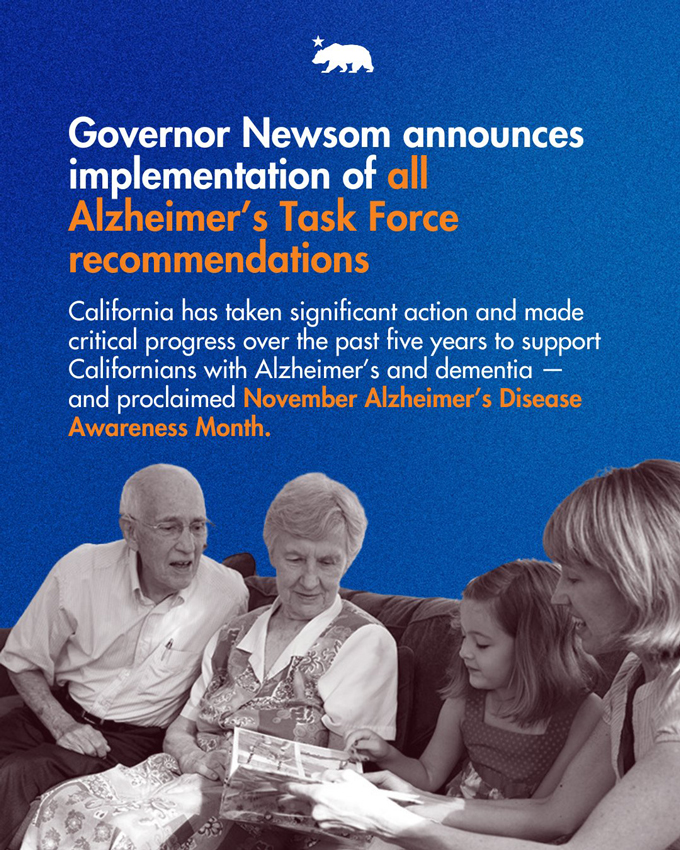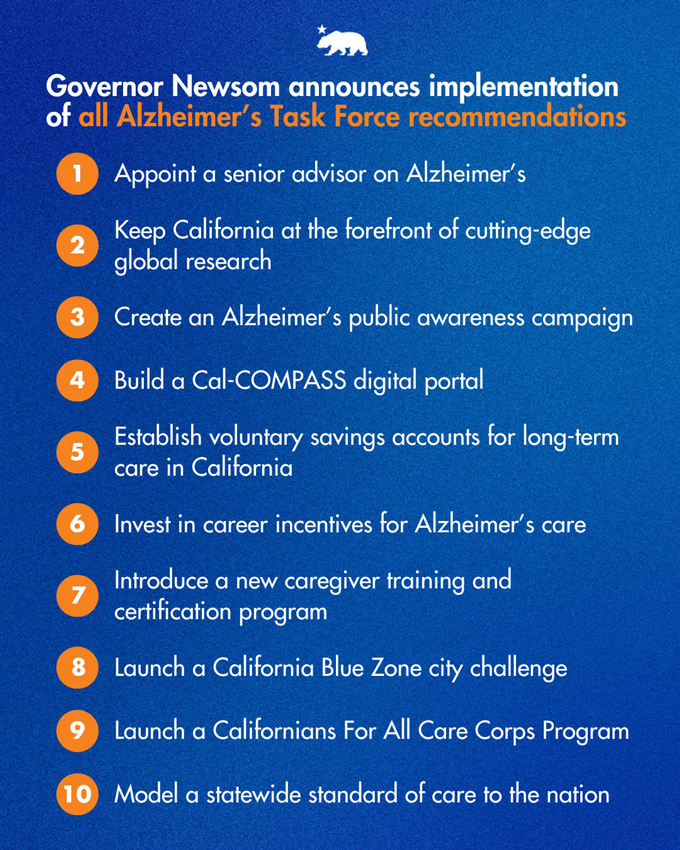What you need to know: What you need to know: Guided by Governor Newsom’s Alzheimer’s Disease Prevention and Preparedness Task Force, the state has taken significant action and made critical progress over the past 5 years to help and support Californians when it comes to Alzheimer’s and dementia, and proclaimed November Alzheimer’s Disease Awareness Month.
November 21, 2024 - SACRAMENTO — Governor Gavin Newsom on Wednesday proclaimed November as Alzheimer’s Disease Awareness Month in California and announced that California’s Alzheimer’s Disease Prevention and Preparedness Task Force has made substantial strides in implementing all 10 key recommendations set forth in 2020 to combat this disease. California’s groundbreaking efforts in Alzheimer’s prevention, research, and support have become a national benchmark, with a focus on providing care for women and diverse racial and ethnic communities at the highest risk.
“As someone whose own father struggled with dementia, I know just how devastating this disease can be on people, on loved ones, on families, and on communities. That’s why I am immensely proud of our task force and the state officials who have been working day in and day out to keep our promises. Thanks to the Task Force, and its chair Maria Shriver, California is now leading the nation in driving down the prevalence of dementia and Alzheimer’s. I encourage every family sitting around the Thanksgiving table next week to talk about healthy aging with their loved ones.”
Governor Gavin Newsom
Why this matters
California has the largest aging population in the nation. As a result, the number of people living with Alzheimer’s disease and related dementias in California is rising, with a disproportionate impact on women and communities of color. Alzheimer’s disease is often mistaken and left undiagnosed because of misconceptions about significant memory loss as a normal sign of aging.
Actions related to the 10 task force’s recommendations and ongoing work will better prepare the state to care for and provide support to Californians as people grow older and the aging population expands.
“The task force embarked on a profound journey, delving deep into the heart of the matter, listening intently to voices often unheard, exploring tirelessly every avenue of research and care, and ultimately proposing groundbreaking solutions for this devastating disease.
“With the implementation of all ten recommendations under Governor Newsom’s leadership, he reaffirms California’s steadfast commitment and pioneering role in our ongoing battle against Alzheimer’s disease.”
Former First Lady Maria Shriver, Chair of the Alzheimer’s Task Force
How we got here
The Governor’s task force has played a pivotal role in shaping California’s comprehensive approach to addressing Alzheimer’s disease. Chaired by Former First Lady of California Maria Shriver -– and joined by experts from diverse sectors, including health care, research, and advocacy – the task force has driven the state’s efforts to strengthen the lives of individuals and families facing Alzheimer’s disease.
Through strategic collaboration and a commitment to innovation, the task force’s report guided the implementation of groundbreaking programs and policies, positioning California as a beacon of progress in the national fight against Alzheimer’s and other dementias.
Recent action
On World Alzheimer’s Day 2024, Governor Newsom signed a package of twelve bills to help California’s law enforcement, doctors and health care providers, and local aging services better serve the growing number of California adults over 60 and their families.
The new laws included action to require law enforcement to have training on preventing and responding to wandering by people with Alzheimer’s, autism, and dementia, and to require continuing education in geriatrics and dementia care for doctors, nurses, and other health care professionals who provide care for people 65 and older as at least 25% of their practice.
Learn more about the actions taken HERE.
Doctor María P. Aranda, professor at the USC Suzanne Dworak-Peck School of Social Work, Executive Director of the USC Edward R. Roybal Institute on Aging and Director of the outreach, recruitment and engagement core of the USC Alzheimer’s Disease Research Center: “Under the auspices of the State of California, members of the Task Force on Alzheimer’s Prevention and Preparedness embarked on a bold plan to invest in the state’s capacity to support families living with Alzheimer’s disease and other dementias. I often serve on committees and co-author reports; this was the first time that I could say that bold actions followed bold words. There is evidence to show that strides have been made for all ten recommendations in our report, with wise public investments of our tax dollars for the good of Californians now and in the future.”
What’s next
As we look ahead to 2030, California remains dedicated to ensuring a dementia-capable continuum of care and providing support for all Californians affected by Alzheimer’s Disease – including taking ongoing steps and using the National Plan’s six goals to organize these efforts.
Bigger picture
Through our guiding principles and strategic priorities and Master Plan on Aging, CalHHS is committed to advancing the state’s vision of a Healthy California for All. California is working with local, state, and federal partners to make the state a healthy, vibrant, inclusive place to live, play, work, and learn.
What the task force is saying
Hilarity for Charity Co-Founder and Filmmaker Lauren Miller Rogen: “Thank you to Gov. Newsom and the Legislature for implementing the recommendations of the Task Force. Funding innovative brain health research, launching a public awareness campaign on prevention, and supporting caregivers are all critical steps toward a dementia-free future in California and beyond.”
Dr. David Lubarsky, Vice Chancellor of Human Health Sciences and Chief Executive Officer, UC Davis Health: “I’m proud to have been part of this state task force of experts and thank the Governor and Maria for their leadership and bringing this group together. Now I’m even more pleased to see all of the recommendations of the task force adopted. As a nation-leading Alzheimer’s Disease research center, we know the impact these changes will have for future patients. These recommendations are important parts of the society-wide efforts needed to slow down this disease’s prevalence. Together, these steps will help people to live healthier, longer into their lives.”

Source: Office of the Governor








